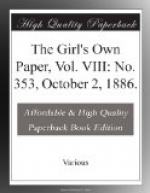“Accuracy of expression,” says Mr. George Seton, in his pleasant “Gossip about Letters and Letter-writers,” “as distinguished from looseness and slovenliness of statement, is of the utmost consequence—not only with the view of saving the time of one’s correspondent, but also to prevent what may prove a very serious misunderstanding. I have known many cases of prolonged litigation which were chiefly owing to some doubtful or equivocal expressions in the course of a business correspondence.”
There are many phrases peculiar to business letters—formal beginnings, for example, such as—
“I am favoured with yours of 14th curt.”
“I duly received your favour of 19th inst.”
“I am in receipt of your lines of y’day, and note that, &c.”
“I beg to confirm my last respects of 25th ult.”
“I beg to confirm my letter of yesterday.”
These phrases and many others which will appear in the course of these articles may seem formal enough, but we must not expect in business to meet with the language of story-books.
A common business term is “advice,” used to mean information sent by letter. For example: “I wait your advice as to the despatch of the parcel.” A funny misunderstanding of the word occurred recently, when a provincial postmaster, new to his duties, in the United States, sent the following communication to the Postmaster-General:—
“Seeing by the regulations that I am required to send you a letter of advice, I must plead in excuse that I have been postmaster but a short time; but I will say, if your office pays no better than mine, I advise you to give it up.”
Every subject mentioned in a letter should have a separate paragraph. Very formal, you may say. Perhaps; but it is also very clear.
Always acknowledge receipt of business letters at the earliest possible opportunity. If they come with money, an acknowledgment ought to be sent by return of post, that is to say, by the first post after they arrive. The same rule may safely be applied to letters coming with any enclosure whatever. Sometimes delay may be of no consequence, but to answer at once will at any rate get you the credit of courtesy.
Of all business letters a copy should be kept. If you write few they may be copied by hand into a book kept for the purpose, but if many the use of a copying-press saves a great deal of monotonous labour, and secures absolute accuracy besides.
The way to use a copying-press is this. Write the letter with copying-ink. Then put a sheet of oiled paper under the leaf of the letter-book on which you wish to take the copy. Letter-books of thin paper are sold for the purpose. Wet the leaf with a brush or soft sponge. On the top of the wet leaf put a sheet of blotting paper, and on the top of that another sheet of oiled paper. Then shut the book, put it in the press, and give it a squeeze for a second to take off the superfluous moisture. Take out the book, remove the blotting-paper and the top sheet of oiled paper, and in their place put your letter face downwards on the damp page. Shut the book, put it back into the copying-press, give it a hard squeeze by means of the lever or screw, leave it in from half a minute to a minute, and the whole thing is done; an exact copy of the letter will be left in your letter-book.




